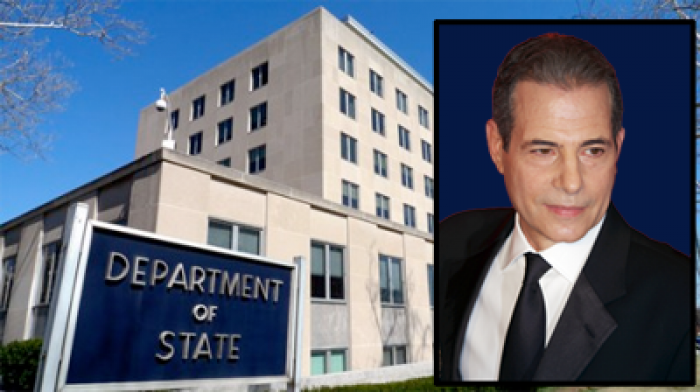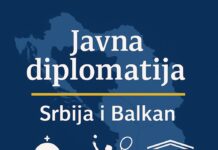The below message was distributed to members of the public diplomacy community via e-mail on Feb. 18, 2014 by the State Department.
 On my first morning as Under Secretary, I wanted to reach out to our many friends and partners who extend, amplify and inform our public diplomacy. You are valued stakeholders in the public diplomacy community and I would like to take this opportunity to introduce myself and share my vision for public diplomacy.
On my first morning as Under Secretary, I wanted to reach out to our many friends and partners who extend, amplify and inform our public diplomacy. You are valued stakeholders in the public diplomacy community and I would like to take this opportunity to introduce myself and share my vision for public diplomacy.
While I am new to government service, I feel I’ve been involved in a form of public diplomacy for much of my life as a journalist and editor. We are living in a new age of diplomacy and global engagement and America is leading that effort. As Secretary Kerry always says, “Diplomacy works.” Diplomacy can, and does, make the world a better and safer place, and every day, in thousands of different ways, America is engaged all across the globe.
Public diplomacy and public affairs have a vital role to play in our foreign policy and national security. We will continue to make sure that our public diplomacy is focused on advancing our foreign policy objectives and goals. To that end, I’m looking at a few priorities vital to our national interests.
First, two larger points about youth and technology that affect everything else.
- With nearly half the world’s population under the age of 30, we need to forge new and deeper connections with young leaders so that they see America as a beacon and as an ally. It is important to our strategic interests that they understand our foreign policy even if they don’t always agree with it. Young people do not have the longstanding connections to or perceptions about America that their parents might have, and this is both a challenge and an opportunity. Our youth focus will put special attention on girls and under-served youth.
- Social media and mobile technology are transformational tools. We need to move toward a digital-first strategy. That doesn’t mean digital only; far from it. It means that our content and programs and messaging should build out from an integrated digital platform. In places around the world where FM radio is the way to reach people, we will build it out from a digital foundation. This isn’t pie-in-the-sky; this is reality. These new technologies will be especially helpful in reaching young people who expect to have a conversation with us, rather than just receiving messages.
Now some specific areas of focus:
Entrepreneurism: We are the entrepreneurial nation and our ability to innovate is one of our most valuable exports. It is also an integral and positive part of the American brand, especially with young people. Economic diplomacy is also a priority for the President and the Secretary. I intend to scale up programs that help entrepreneurs and start-ups around the world and connect successful American business leaders with aspiring entrepreneurs. We should be looking not only to promote economic opportunity but to do so among disadvantaged groups.
Educational Diplomacy: Higher education is one of America’s greatest strategic assets, and we must use it. Our educational institutions are laboratories of democracy, while English skills are critical to success in the new global economy. Our educational exchanges need to move into the 21st century and adapt to new technologies like MOOCs and new areas of expertise such as STEM so that they can continue their role as incubators of democracy. We need to use our leadership in technology and innovation to create young scientific and technological innovators – especially young women who have been under-served in this area.
Environmental Diplomacy: Secretary Kerry has stressed from day one that it will take nothing less than a global conversation to educate, inform, awaken and activate millions of people around the world about the environmental challenges the world faces – challenges which cannot be solved by any single nation. Whether it’s global climate change or the plight of the oceans, the Secretary is determined to help the President awaken our consciousness globally about a range of environmental issues. This requires a massive public diplomacy effort.
Countering Violent Extremism: It is vital to our national security that we provide people, particularly young people in at-risk environments, with alternatives to the misguided ideological justifications for using violence. We must confront distortion with reality and rebut lies with truth. We will expand and coordinate the State Department’s worldwide efforts to counter radicalization and combat violent extremist messaging.
Professional Growth: We cannot succeed unless our people are prepared and supported to succeed. It is critical that public diplomacy be valued as a core element of our overall foreign policy mission and that our public diplomacy professionals receive the training, resources and institutional recognition to ensure success in that mission. We need a new 21st century tool kit for public diplomacy. I am passionately committed to the growth and development of our profession.
These are big issues that require a focused alignment of resources, and sustained effort. I aim to reinvigorate public diplomacy, ensure our practitioners are on the forefront of technology, and keep public diplomacy an integral part of our larger policy goals. I am keenly aware of the robust contributions you can bring to our mutual interests. So I welcome your thoughts and seek your support. You are part of a broad public diplomacy network and your partnership is critical to successful, dynamic American public diplomacy. I look forward to meeting and working with you in the coming weeks.













